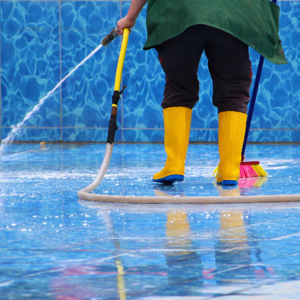
Swimming Pool Safety During Inclement Weather: Tips for Preparedness
Swimming pools can be great fun and relaxation during the warm summer months. Still, it's important to prioritize safety and preparedness to prevent accidents and ensure a safe environment. Here are some tips for swimming pool safety:
Install & Maintain Pool Safety Measures:
- Install a sturdy fence around the pool area with a self-latching gate to restrict access when the pool is not in use.
- Use pool covers or safety nets when the pool is not in use to prevent accidental entry.
- Install pool alarms that can alert you if someone enters the pool area or if there is movement in the water.
Learn & Teach Swimming Skills:
- Enroll yourself and your family in swimming lessons to learn proper swimming techniques and water safety skills.
- Ensure that children are always supervised by a responsible adult when in or near the pool.
- Teach children basic water safety rules, such as not running around the pool, not diving in shallow water, and staying away from pool drains and filters.
Have Appropriate Safety Equipment:
- Keep lifesaving equipment near the pool area, such as life jackets, reaching poles, and flotation devices.
- Ensure that everyone knows how to use the safety equipment and that it is easily accessible in an emergency.
Learn CPR & First Aid:
Regular Maintenance & Inspections:
- Regularly inspect the pool area for any potential hazards, such as broken tiles, loose handrails, or damaged equipment, and address them promptly.
- Clean the pool and maintain proper chemical levels to ensure safe water conditions.
- Regularly check and maintain pool equipment, such as filters and pumps, to ensure they function correctly.
Emergency Preparedness:
- Make emergency contact numbers available, including the local emergency services and the nearest hospital.
- Post CPR instructions and emergency procedures near the pool area for easy reference.
- Educate everyone in the household on what to do in an emergency, including how to call for help and perform basic water rescue techniques if necessary.
Stay Vigilant:
- Always be alert and supervise children and inexperienced swimmers closely when they are in or around the pool.
- Avoid distractions like mobile phones or other activities that may distract your attention from monitoring the pool.
By following these swimming pool safety tips, you can create a safer environment for everyone enjoying the pool and reduce the risk of accidents or emergencies. Remember, constant supervision and adherence to safety measures are crucial to ensuring a safe and enjoyable swimming experience.
Swimming pool safety is crucial, especially during inclement weather, to ensure the safety of individuals and protect the pool from potential damage. Here are some critical considerations for swimming pool preparedness during inclement weather:
- Regular maintenance: Proper pool maintenance is essential to ensure the pool's structural integrity and functionality. Regularly inspect and maintain the pool equipment, including pumps, filters, and drains. Keep the pool clean, balanced, and debris-free to prevent clogging and damage.
- Secure pool covers: If severe weather is expected, such as storms or hurricanes, securing the pool with a sturdy pool cover is advisable. This helps protect the pool from debris, prevents water contamination, and reduces the risk of damage caused by heavy rainfall or wind.
- Remove loose objects: Remove any loose objects or items from the pool area before inclement weather approaches. This includes pool furniture, toys, umbrellas, and other things that can be picked up and carried away by strong winds, potentially causing damage or injury.
- Turn off electrical equipment: In a thunderstorm, it is crucial to turn off and disconnect all electrical equipment associated with the pool, such as pumps, heaters, and lights. This helps prevent electrical damage and reduces the risk of electric shock during lightning strikes.
- Monitor water levels: Heavy rainfall during a storm can cause the pool water level to rise rapidly. Monitor the water level and ensure it does not overflow, which can lead to flooding and potential damage to the pool and surrounding areas. If needed, use a submersible pump to lower the water level.
- Ensure proper drainage: Check the pool's drainage system and it’s functioning correctly. Adequate drainage prevents water accumulation around the pool, which can cause flooding and structural damage.
- Stay informed about severe weather: Keep yourself updated on weather forecasts and any severe weather warnings issued by local authorities. This allows you to take timely precautions and make informed decisions regarding pool safety and preparedness.
Remember, personal safety should always be the top priority during inclement weather. Avoid using the pool during storms, as lightning poses a significant risk when near water. It's advisable to follow local safety guidelines and adhere to any pool closure recommendations or evacuation orders issued by authorities.
By practicing swimming pool preparedness and taking appropriate precautions during inclement weather, you can help protect the pool, prevent damage, and ensure the safety of individuals using the pool and its surroundings.


